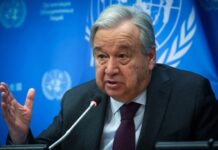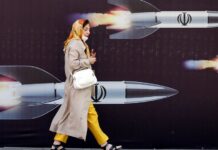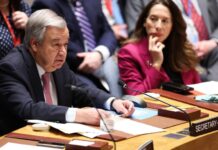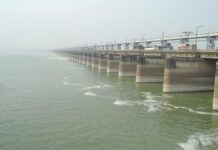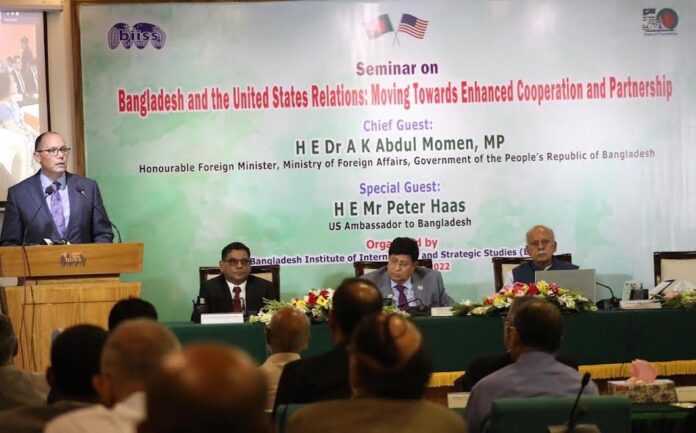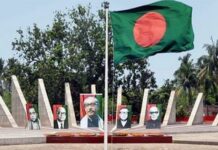Foreign Minister Dr AK Abdul Momen on Sunday said Dhaka would welcome observers from the United States to monitor the upcoming 2023 general elections as US Ambassador Peter Haas said Washington would strictly maintain its neutrality as far as Bangladesh polls were concerned.
“I have invited all . . . anyone (who) wants come and observe (the polls) . . . you (also) are most welcome to come with your (US) observers,” Momen told a Bangladesh Institute of International and Strategic Studies (BIISS) seminar.
Bangladesh, he said, established all required instruments that for holding free, fair, transparent elections.
Momen’s comments came as the newly appointed US envoy in Dhaka said his country simply expected a democratic process to be followed that would allow Bangladeshis to freely decide who would run their country.
“(But) Let me be clear. The United States will not pick a side in the upcoming elections,” Hass told the seminar titled “Bangladesh and the United States Relations: Moving towards Enhanced Cooperation and Partnership” at the BIISS auditorium.
The ambassador touched upon various issues related to US-Bangladesh bilateral ties in areas including economy, law enforcement, defense and strategic cooperation, democracy, human rights and people to people contact.
“The US-Bangladesh relationship is at a turning point. The US is ready to hit the gas to enhance our partnership and realise the great potential of our relationship … we are ready to move as quickly as you are,” he said.
Law enforcement
Hass said the US sanctions against Bangladesh’s elite anti-crime Rapid Action Battallion (RAB) did not mean the US could not enhance strong law enforcement security cooperation with Bangladesh but ruled out possibilities of scrapping the sanctions without concrete actions to ensure RAB’s accountibility.
“I will be honest. There is no scope for repeal of sanctions against the Rapid Action Battalion without concrete action and accountability.”
He said the US wanted to see a RAB that remains effective at combating terrorism, but that “does so while respecting basic human rights”.
“We will continue to work with Bangladesh to combat transnational crime and terrorism, enhance border security, and prevent violent extremism,” he said.
Bangladesh and the United States earlier agreed on a proposal to enhance police capacities to fight terrorism with enhanced US assistance.
Hass said the signing of the proposed Memorandum of Agreement would facilitate the US ability to implement “our Anti-Terrorism Assistance training programme and to donate new equipment to the different units of Bangladesh police”.
Security cooperation
“We can increase our security cooperation,” Haas said adding that the two countries were already engaged as peers in the defense sphere and the engagement could be strengthened further over joint military exercises by “bringing in other like-minded mutual partners.”
He said Washington and Dhaka could move forward on two basic foundational agreements – General Security of Military Information Agreement (GSOMIA) and Acquisition and Cross-Servicing Agreement (ACSA).
“There are a lot of misperceptions about the GSOMIA and ACSA. They are technical agreements. They do not reflect an “alliance” or “military pact,” Haas said adding these agreements don’t constitute a “broad and vague defense cooperation agreement”, such as the one Bangladesh signed with China in 2002.
He said the GSOMIA would set ground rules for exchanging sensitive information about military procurements which enable Dhaka to modernize its military with US technology, contributing to Bangladesh’s Forces Goal 2030.
On the other hand, the envoy said the ACSA would allow US militaries to offer each other assistance on the high seas, to lend equipment or spare parts when an aircraft, vehicle, or vessel is in trouble, or to simply exchange fuel and food.
Economic cooperation
The ambassador said Bangladesh is now one of the fastest growing economies in the Indo-Pacific while the country is racing ahead toward middle income status.
“This change brings about a new dynamic. Simply put, the United States conducts diplomacy with major economies and with regional leaders differently,” he said.
The ambassador said Washington is ready to move the economic relationship forward with Bangladesh while the first ever full-time attach, from the US Department of Commerce will be posted at here in this summer.
“This is a testament to the importance we place on growing our two-way trade and investment relationship,” he said.
Next month, the ambassador said the Executive Committee of the U.S.-Bangladesh Business Council will pay its maiden visit here.
“How Bangladesh regulates internet activity will also impact foreign investment and the willingness of companies to do business in Bangladesh,” he added.
The envoy said the US is committed to supporting Bangladesh’s labor rights journey, including through targeted development assistance while a new attach, from the US Department of Labor is scheduled to join US embassy here next year to enhance cooperation in this regards.


